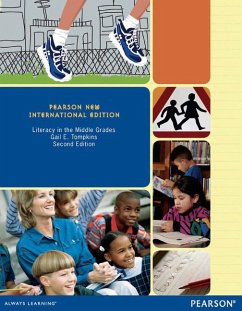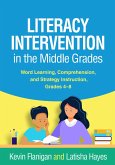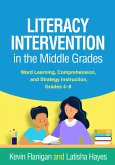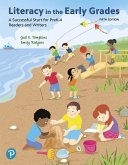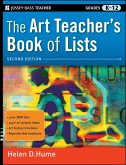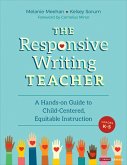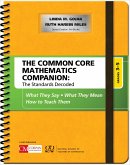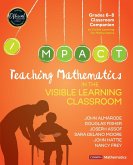Literacy in the Middle Grades has been crafted to answer the questions of teachers working with young adolescents. By addressing the realities of teaching in the middle grades – the changing needs of adolescents; the increasing diversity in the classroom; the constantly changing technology available to teachers; the newest federal, state, and curricular demands – this thoroughly applied new edition situates literacy instruction in the contemporary classroom to help new and experienced teachers help young adolescents develop strong literacy skills.
Features + Benefits
Struggling Readers and Writers
This feature pinpoints the ways in which readers and writers may struggle with each chapter’s concepts, and helps provide the answers concerning how best to help struggling students develop the strategies to succeed.
Scaffolding English Learners
These chapter sections help readers focus instruction to better meet adolescent English learners’ literacy needs.
Spotlights
This in-depth feature models differentiated instruction one student at a time. Each spotlight features an individual student — one below grade level, one on grade level, and one above grade level — to give readers a good look at the individual needs of young adolescents, and to provide the tools to help them become successful readers and writers.
Minilessons
This invaluable tool perfect for taking directly into the classroom gives new teachers specific classroom tools for developing one literacy skill or strategy at a time.
Guidelines
This boxed feature bullet points the most important things teachers need to know when teaching a specific topic.
Assessment Tools
Boxed features in every chapter build on the ideas in Chapter 3 on Assessment, helping new teachers understand the ways in which assessment figures into every concept they will teach.
New Literacies
This new feature looks at technology and the ways in which it can assist in the teaching of reading and writing.
Be Strategic!
This new feature explores some of the innovative ways students extend their literacy knowledge and expertise as they use the internet and other digital technology.
Compendium of Instructional Procedures
This invaluable bank of step by step procedures prepares you to hit the ground running in your own classroom.
Part 1: Literacy in the 21st Century
3 Assessing Literacy Learning
4 Differentiating Instruction
Part 2: Powerful Teaching
5 Eliminating Obstacles to Fluency
6 Expanding Academic Vocabulary
7 Promoting Comprehension: Reader Factors
8 Promoting Comprehension: Text Factors
9 Teaching Writing
Part 3: Effective Instructional Programs
10 Teaching with Trade Books
11 Teaching with Textbooks
12 Using Literacy in the Content Areas
Part 4: Compendium of Instructional Procedures
Hinweis: Dieser Artikel kann nur an eine deutsche Lieferadresse ausgeliefert werden.
Features + Benefits
Struggling Readers and Writers
This feature pinpoints the ways in which readers and writers may struggle with each chapter’s concepts, and helps provide the answers concerning how best to help struggling students develop the strategies to succeed.
Scaffolding English Learners
These chapter sections help readers focus instruction to better meet adolescent English learners’ literacy needs.
Spotlights
This in-depth feature models differentiated instruction one student at a time. Each spotlight features an individual student — one below grade level, one on grade level, and one above grade level — to give readers a good look at the individual needs of young adolescents, and to provide the tools to help them become successful readers and writers.
Minilessons
This invaluable tool perfect for taking directly into the classroom gives new teachers specific classroom tools for developing one literacy skill or strategy at a time.
Guidelines
This boxed feature bullet points the most important things teachers need to know when teaching a specific topic.
Assessment Tools
Boxed features in every chapter build on the ideas in Chapter 3 on Assessment, helping new teachers understand the ways in which assessment figures into every concept they will teach.
New Literacies
This new feature looks at technology and the ways in which it can assist in the teaching of reading and writing.
Be Strategic!
This new feature explores some of the innovative ways students extend their literacy knowledge and expertise as they use the internet and other digital technology.
Compendium of Instructional Procedures
This invaluable bank of step by step procedures prepares you to hit the ground running in your own classroom.
Part 1: Literacy in the 21st Century
3 Assessing Literacy Learning
4 Differentiating Instruction
Part 2: Powerful Teaching
5 Eliminating Obstacles to Fluency
6 Expanding Academic Vocabulary
7 Promoting Comprehension: Reader Factors
8 Promoting Comprehension: Text Factors
9 Teaching Writing
Part 3: Effective Instructional Programs
10 Teaching with Trade Books
11 Teaching with Textbooks
12 Using Literacy in the Content Areas
Part 4: Compendium of Instructional Procedures
Hinweis: Dieser Artikel kann nur an eine deutsche Lieferadresse ausgeliefert werden.

